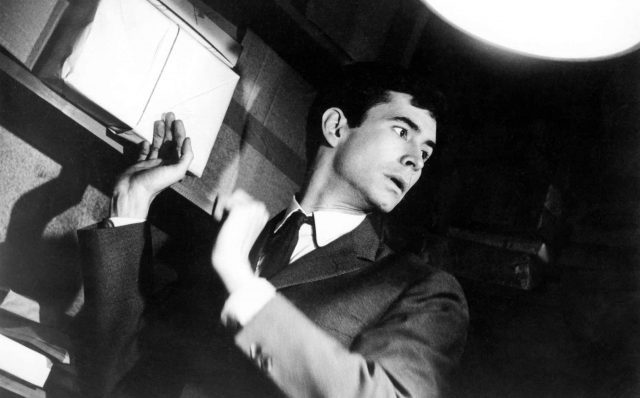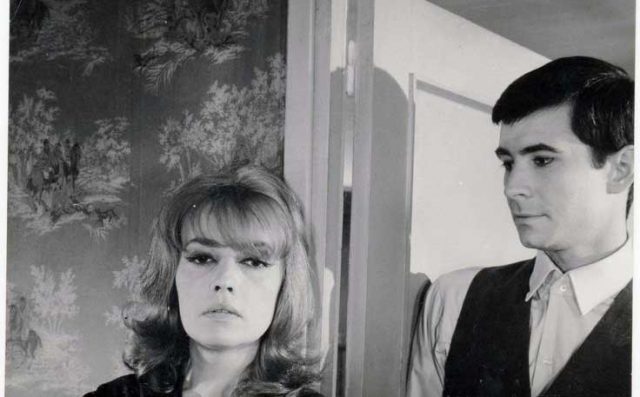
Anthony Perkins stars as Josef K. in Orson Welles’s adaptation of Franz Kafka’s The Trial
THE TRIAL (Orson Welles, 1962)
Film Forum
209 West Houston St.
September 1-7
212-727-8110
filmforum.org
 “The Trial is the best film I have ever made,” Orson Welles told the BBC in a 1962 interview. While that might not be quite true — Welles already had Citizen Kane, The Magnificent Ambersons, Macbeth, Othello, and Touch of Evil on his resume — his free-form adaptation of Franz Kafka’s posthumously published 1925 novel is an extraordinary work that has only been increasing in critical stature since its 1962 release. The absurdist drama now can be seen in a new restoration playing September 1-7 as part of a two-movie Film Forum tribute to Jeanne Moreau that also includes Jacques Demy’s Bay of Angels; Moreau passed away on July 31 at the age of eighty-nine. Welles reordered the narrative and changed the ending in telling Kafka’s harrowing tale of Josef K. (Anthony Perkins), a low-level bureaucrat who suddenly finds himself in the midst of a mysterious existential ordeal, under arrest for an unnamed crime and facing an unknown fate. Welles begins the film with Kafka’s “Before the Law” parable, told by the auteur over “pin-screen animation” by Alexander Alexeïeff and Claire Parker. Later, Welles, as Albert Hastler, known as the Advocate, repeats the story to Josef, confirming that Welles the filmmaker is fully in control, serving as judge, jury, and executioner of everything we see and hear — and we indeed hear a lot of Welles, who dubbed the voices for many of the characters himself. At the end of the opening parable, Welles explains, “’Tis been said that the logic of this story is the logic of a dream . . . of a nightmare,” and the camera then focuses in on Josef in bed, where he’s about to be roused and placed under arrest.
“The Trial is the best film I have ever made,” Orson Welles told the BBC in a 1962 interview. While that might not be quite true — Welles already had Citizen Kane, The Magnificent Ambersons, Macbeth, Othello, and Touch of Evil on his resume — his free-form adaptation of Franz Kafka’s posthumously published 1925 novel is an extraordinary work that has only been increasing in critical stature since its 1962 release. The absurdist drama now can be seen in a new restoration playing September 1-7 as part of a two-movie Film Forum tribute to Jeanne Moreau that also includes Jacques Demy’s Bay of Angels; Moreau passed away on July 31 at the age of eighty-nine. Welles reordered the narrative and changed the ending in telling Kafka’s harrowing tale of Josef K. (Anthony Perkins), a low-level bureaucrat who suddenly finds himself in the midst of a mysterious existential ordeal, under arrest for an unnamed crime and facing an unknown fate. Welles begins the film with Kafka’s “Before the Law” parable, told by the auteur over “pin-screen animation” by Alexander Alexeïeff and Claire Parker. Later, Welles, as Albert Hastler, known as the Advocate, repeats the story to Josef, confirming that Welles the filmmaker is fully in control, serving as judge, jury, and executioner of everything we see and hear — and we indeed hear a lot of Welles, who dubbed the voices for many of the characters himself. At the end of the opening parable, Welles explains, “’Tis been said that the logic of this story is the logic of a dream . . . of a nightmare,” and the camera then focuses in on Josef in bed, where he’s about to be roused and placed under arrest.
Josef has no idea what he’s done, shocked to find Inspector A (Arnoldo Foà) hovering over him and three of his coworkers searching the room of his landlady, Mrs. Grubach (Madeleine Robinson). His teenage cousin, Irmie (Naydra Shore), is concerned for him, and his uncle, Max (Max Haufler), takes him to see Hastler to beg the powerful Advocate to handle Josef’s case. As he gets more caught up in the puzzling conundrums, he meets such oddball characters as the pitiful Bloch (Akim Tamiroff), another Advocate client; the Chief Clerk (Fernand Ledoux); the Examining Magistrate (Max Buchsbaum); the Courtroom Guard (Wolfgang Reichmann); a priest (Michael Lonsdale); and painter Titorelli (William Chappell), whose bizarre tree-house-like studio is surrounded by giddy young girls. The locations are spectacular; lacking the necessary budget to build sets, Welles was going to use vast, empty spaces, but instead he accidentally came upon the abandoned Gare d’Orsay train station in Paris, which featured immensely large rooms that evoked an endless Baroque warehouse. He also shot in a Stalinist apartment complex in Zagreb, Yugoslavia, which evoked the cold uniformity of the lives of its citizenry. Each set offers surprises for the viewer, beginning with Josef’s bedroom, which cinematographer Edmond Richard (Chimes at Midnight, The Discreet Charm of the Bourgeisie) shoots at skewed, low angles, keeping everything off balance while the tall Perkins struggles to avoid hitting his head on the ceiling, trapped from the very start.

Jeanne Moreau and Anthony Perkins play neighbors in Orson Welles’s The Trial
Josef goes on a metaphysical journey, accompanied by Tomaso Albinoni’s grand, emotional Adagio for Organ and Strings and jazzy noir, that takes him to Hastler’s bedroom, where the Advocate seems to spend most of his time sleeping, smoking, eating, and drinking instead of tending to his clients; a room stuffed with stacks of old, decaying files, as if there’s no longer any past; and an office with perfectly arranged rows and rows of robotic workers at desks. In a large courtroom, Josef picks up a law book, but it is thickly covered with dust, as if it hasn’t been opened in a long time, letting him know that justice is going to be hard to come by in this surreal world. He might think he is guilty of nothing, but in Welles’s conception of Kafka’s tale, anyone living within the constructs of this society is automatically implicated. Josef is also guilty of a certain kind of sexual misconduct with women; he is attracted to nearly every female he meets, whether single, married, or involved with another, including Burstner, Leni (Romy Schneider), Hilda (Elsa Martinelli), Miss Pittl (Suzanne Flon), and the court archivist (Paola Mori), stopping his supposedly desperate search for the truth to snag a kiss, a hug, or a possible quick roll in the hay, even if it complicates his mission. In so doing, Josef — and Welles, of course — condemns us all. “It’s the most autobiographical movie that I’ve ever made, the only one that’s really close to me,” Welles wrote of the film. “It’s much closer to my own feelings about everything than any other picture I’ve made.” That quote might indeed be true; despite all of the surreal absurdity in The Trial, there is something inherently frightening and believable about it, especially when viewed today, in a world dominated by surveillance, the surrender of private space, and a system of government with a rapidly deteriorating rule of law.